Are People Forgetting Real Life Due to Social Media's Virtual World?
VerifiedAdded on 2023/03/31
|7
|1583
|362
Essay
AI Summary
This argumentative essay delves into the multifaceted impact of social media on modern life, focusing on whether it connects or disconnects individuals from their real-world experiences. The essay begins by acknowledging social media's role in communication, education, and business, while also highlighting its potential to disrupt real-life interactions. The core argument posits that social media disconnects people from reality, supported by reasons like addiction to attractive online content and the psychological impacts of impulsive engagement. A counterargument presents social media as a tool for connecting people, particularly those separated by distance, and facilitating communication. The essay utilizes research from various experts to support its arguments, including studies on addiction, social engagement, and the effects of digital media on relationships. The essay concludes by emphasizing the need to balance virtual and real-life interactions to maximize the benefits of social media.
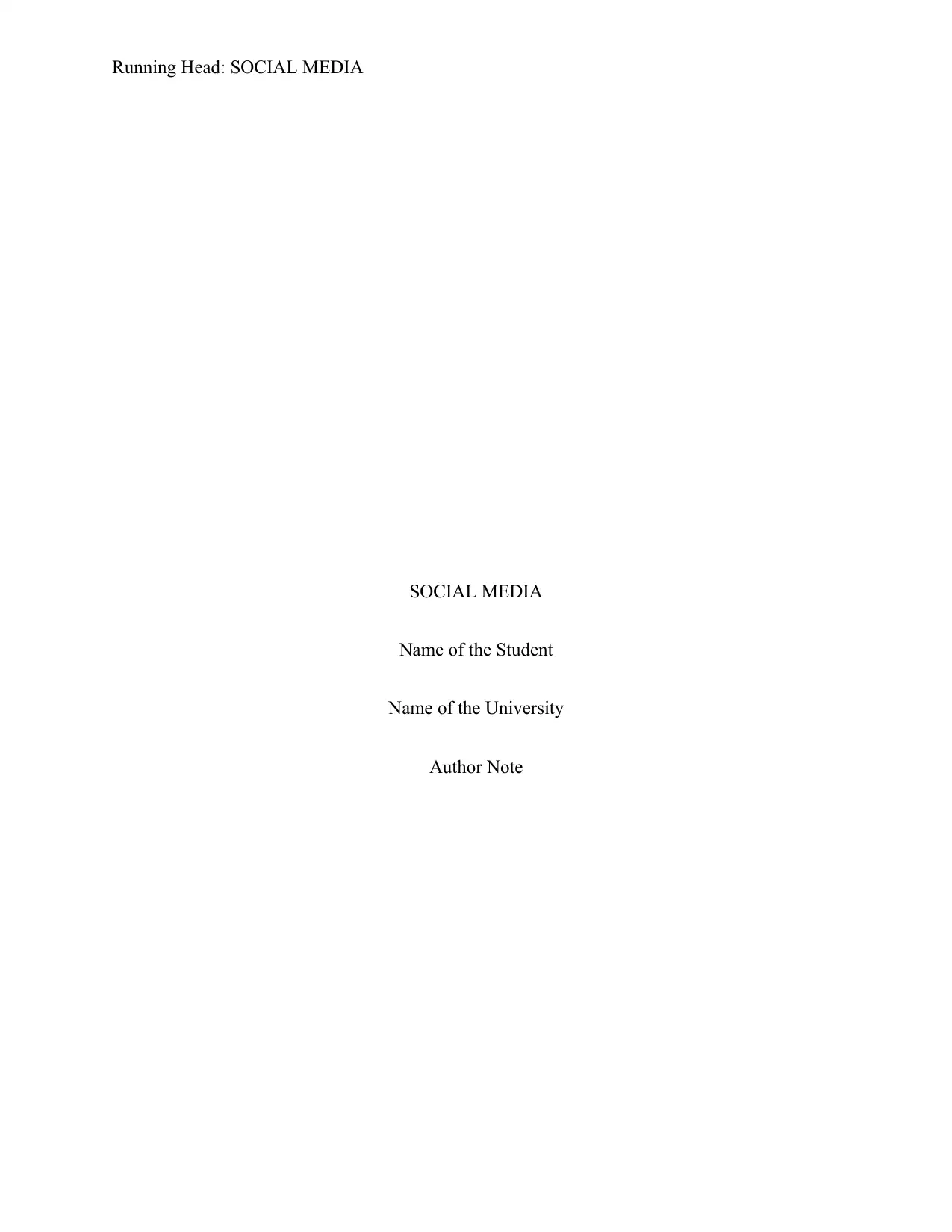
Running Head: SOCIAL MEDIA
SOCIAL MEDIA
Name of the Student
Name of the University
Author Note
SOCIAL MEDIA
Name of the Student
Name of the University
Author Note
Paraphrase This Document
Need a fresh take? Get an instant paraphrase of this document with our AI Paraphraser
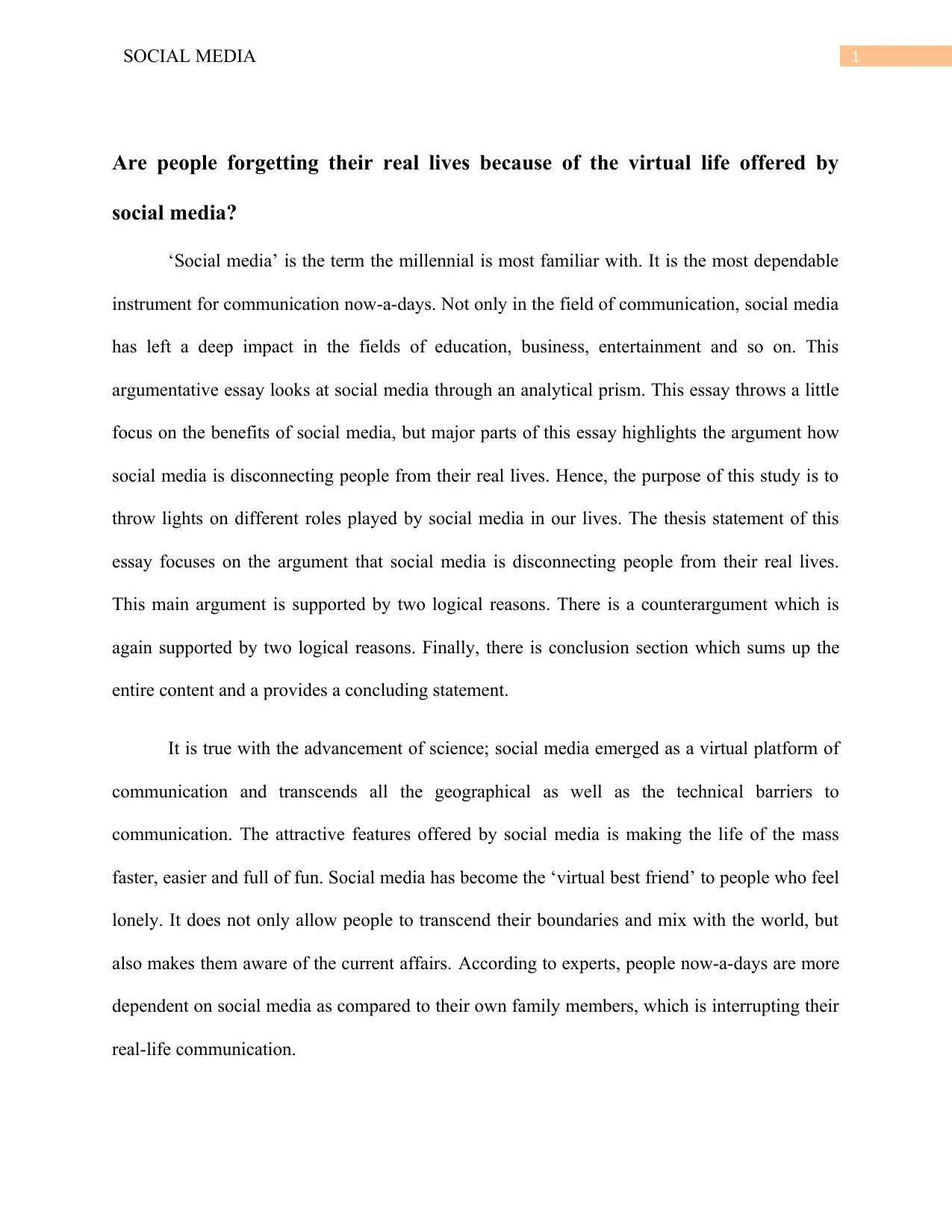
1SOCIAL MEDIA
Are people forgetting their real lives because of the virtual life offered by
social media?
‘Social media’ is the term the millennial is most familiar with. It is the most dependable
instrument for communication now-a-days. Not only in the field of communication, social media
has left a deep impact in the fields of education, business, entertainment and so on. This
argumentative essay looks at social media through an analytical prism. This essay throws a little
focus on the benefits of social media, but major parts of this essay highlights the argument how
social media is disconnecting people from their real lives. Hence, the purpose of this study is to
throw lights on different roles played by social media in our lives. The thesis statement of this
essay focuses on the argument that social media is disconnecting people from their real lives.
This main argument is supported by two logical reasons. There is a counterargument which is
again supported by two logical reasons. Finally, there is conclusion section which sums up the
entire content and a provides a concluding statement.
It is true with the advancement of science; social media emerged as a virtual platform of
communication and transcends all the geographical as well as the technical barriers to
communication. The attractive features offered by social media is making the life of the mass
faster, easier and full of fun. Social media has become the ‘virtual best friend’ to people who feel
lonely. It does not only allow people to transcend their boundaries and mix with the world, but
also makes them aware of the current affairs. According to experts, people now-a-days are more
dependent on social media as compared to their own family members, which is interrupting their
real-life communication.
Are people forgetting their real lives because of the virtual life offered by
social media?
‘Social media’ is the term the millennial is most familiar with. It is the most dependable
instrument for communication now-a-days. Not only in the field of communication, social media
has left a deep impact in the fields of education, business, entertainment and so on. This
argumentative essay looks at social media through an analytical prism. This essay throws a little
focus on the benefits of social media, but major parts of this essay highlights the argument how
social media is disconnecting people from their real lives. Hence, the purpose of this study is to
throw lights on different roles played by social media in our lives. The thesis statement of this
essay focuses on the argument that social media is disconnecting people from their real lives.
This main argument is supported by two logical reasons. There is a counterargument which is
again supported by two logical reasons. Finally, there is conclusion section which sums up the
entire content and a provides a concluding statement.
It is true with the advancement of science; social media emerged as a virtual platform of
communication and transcends all the geographical as well as the technical barriers to
communication. The attractive features offered by social media is making the life of the mass
faster, easier and full of fun. Social media has become the ‘virtual best friend’ to people who feel
lonely. It does not only allow people to transcend their boundaries and mix with the world, but
also makes them aware of the current affairs. According to experts, people now-a-days are more
dependent on social media as compared to their own family members, which is interrupting their
real-life communication.
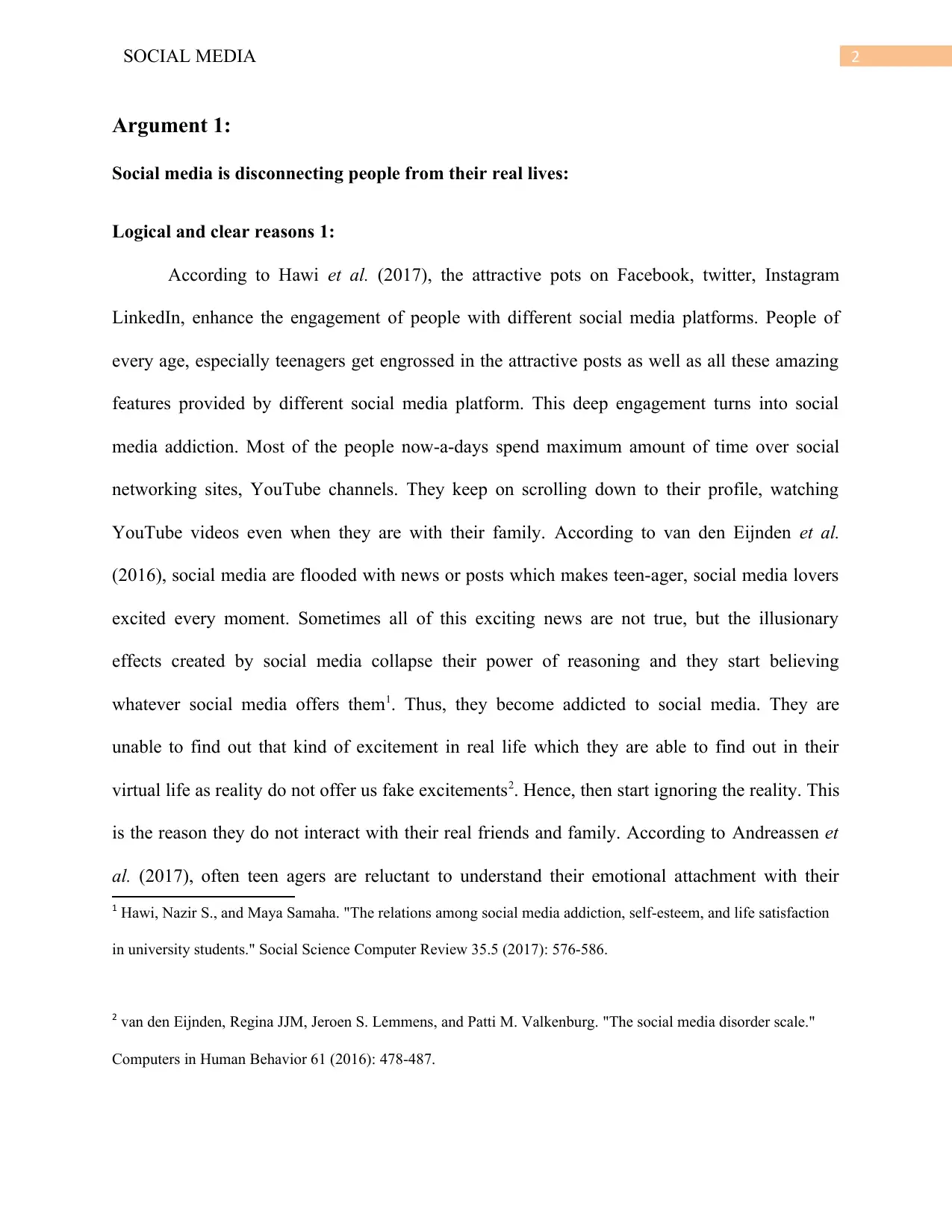
2SOCIAL MEDIA
Argument 1:
Social media is disconnecting people from their real lives:
Logical and clear reasons 1:
According to Hawi et al. (2017), the attractive pots on Facebook, twitter, Instagram
LinkedIn, enhance the engagement of people with different social media platforms. People of
every age, especially teenagers get engrossed in the attractive posts as well as all these amazing
features provided by different social media platform. This deep engagement turns into social
media addiction. Most of the people now-a-days spend maximum amount of time over social
networking sites, YouTube channels. They keep on scrolling down to their profile, watching
YouTube videos even when they are with their family. According to van den Eijnden et al.
(2016), social media are flooded with news or posts which makes teen-ager, social media lovers
excited every moment. Sometimes all of this exciting news are not true, but the illusionary
effects created by social media collapse their power of reasoning and they start believing
whatever social media offers them1. Thus, they become addicted to social media. They are
unable to find out that kind of excitement in real life which they are able to find out in their
virtual life as reality do not offer us fake excitements2. Hence, then start ignoring the reality. This
is the reason they do not interact with their real friends and family. According to Andreassen et
al. (2017), often teen agers are reluctant to understand their emotional attachment with their
1 Hawi, Nazir S., and Maya Samaha. "The relations among social media addiction, self-esteem, and life satisfaction
in university students." Social Science Computer Review 35.5 (2017): 576-586.
2 van den Eijnden, Regina JJM, Jeroen S. Lemmens, and Patti M. Valkenburg. "The social media disorder scale."
Computers in Human Behavior 61 (2016): 478-487.
Argument 1:
Social media is disconnecting people from their real lives:
Logical and clear reasons 1:
According to Hawi et al. (2017), the attractive pots on Facebook, twitter, Instagram
LinkedIn, enhance the engagement of people with different social media platforms. People of
every age, especially teenagers get engrossed in the attractive posts as well as all these amazing
features provided by different social media platform. This deep engagement turns into social
media addiction. Most of the people now-a-days spend maximum amount of time over social
networking sites, YouTube channels. They keep on scrolling down to their profile, watching
YouTube videos even when they are with their family. According to van den Eijnden et al.
(2016), social media are flooded with news or posts which makes teen-ager, social media lovers
excited every moment. Sometimes all of this exciting news are not true, but the illusionary
effects created by social media collapse their power of reasoning and they start believing
whatever social media offers them1. Thus, they become addicted to social media. They are
unable to find out that kind of excitement in real life which they are able to find out in their
virtual life as reality do not offer us fake excitements2. Hence, then start ignoring the reality. This
is the reason they do not interact with their real friends and family. According to Andreassen et
al. (2017), often teen agers are reluctant to understand their emotional attachment with their
1 Hawi, Nazir S., and Maya Samaha. "The relations among social media addiction, self-esteem, and life satisfaction
in university students." Social Science Computer Review 35.5 (2017): 576-586.
2 van den Eijnden, Regina JJM, Jeroen S. Lemmens, and Patti M. Valkenburg. "The social media disorder scale."
Computers in Human Behavior 61 (2016): 478-487.
⊘ This is a preview!⊘
Do you want full access?
Subscribe today to unlock all pages.

Trusted by 1+ million students worldwide
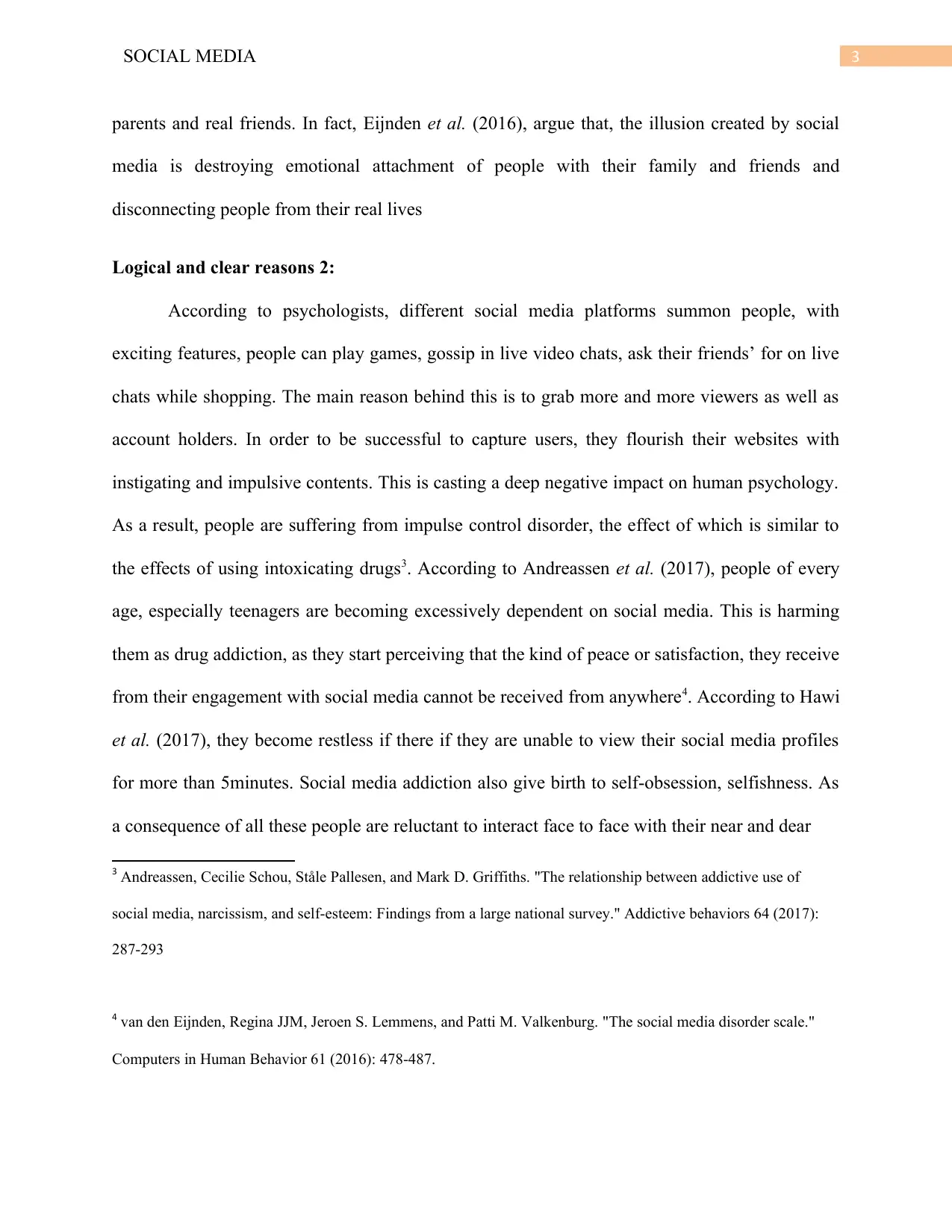
3SOCIAL MEDIA
parents and real friends. In fact, Eijnden et al. (2016), argue that, the illusion created by social
media is destroying emotional attachment of people with their family and friends and
disconnecting people from their real lives
Logical and clear reasons 2:
According to psychologists, different social media platforms summon people, with
exciting features, people can play games, gossip in live video chats, ask their friends’ for on live
chats while shopping. The main reason behind this is to grab more and more viewers as well as
account holders. In order to be successful to capture users, they flourish their websites with
instigating and impulsive contents. This is casting a deep negative impact on human psychology.
As a result, people are suffering from impulse control disorder, the effect of which is similar to
the effects of using intoxicating drugs3. According to Andreassen et al. (2017), people of every
age, especially teenagers are becoming excessively dependent on social media. This is harming
them as drug addiction, as they start perceiving that the kind of peace or satisfaction, they receive
from their engagement with social media cannot be received from anywhere4. According to Hawi
et al. (2017), they become restless if there if they are unable to view their social media profiles
for more than 5minutes. Social media addiction also give birth to self-obsession, selfishness. As
a consequence of all these people are reluctant to interact face to face with their near and dear
3 Andreassen, Cecilie Schou, Ståle Pallesen, and Mark D. Griffiths. "The relationship between addictive use of
social media, narcissism, and self-esteem: Findings from a large national survey." Addictive behaviors 64 (2017):
287-293
4 van den Eijnden, Regina JJM, Jeroen S. Lemmens, and Patti M. Valkenburg. "The social media disorder scale."
Computers in Human Behavior 61 (2016): 478-487.
parents and real friends. In fact, Eijnden et al. (2016), argue that, the illusion created by social
media is destroying emotional attachment of people with their family and friends and
disconnecting people from their real lives
Logical and clear reasons 2:
According to psychologists, different social media platforms summon people, with
exciting features, people can play games, gossip in live video chats, ask their friends’ for on live
chats while shopping. The main reason behind this is to grab more and more viewers as well as
account holders. In order to be successful to capture users, they flourish their websites with
instigating and impulsive contents. This is casting a deep negative impact on human psychology.
As a result, people are suffering from impulse control disorder, the effect of which is similar to
the effects of using intoxicating drugs3. According to Andreassen et al. (2017), people of every
age, especially teenagers are becoming excessively dependent on social media. This is harming
them as drug addiction, as they start perceiving that the kind of peace or satisfaction, they receive
from their engagement with social media cannot be received from anywhere4. According to Hawi
et al. (2017), they become restless if there if they are unable to view their social media profiles
for more than 5minutes. Social media addiction also give birth to self-obsession, selfishness. As
a consequence of all these people are reluctant to interact face to face with their near and dear
3 Andreassen, Cecilie Schou, Ståle Pallesen, and Mark D. Griffiths. "The relationship between addictive use of
social media, narcissism, and self-esteem: Findings from a large national survey." Addictive behaviors 64 (2017):
287-293
4 van den Eijnden, Regina JJM, Jeroen S. Lemmens, and Patti M. Valkenburg. "The social media disorder scale."
Computers in Human Behavior 61 (2016): 478-487.
Paraphrase This Document
Need a fresh take? Get an instant paraphrase of this document with our AI Paraphraser
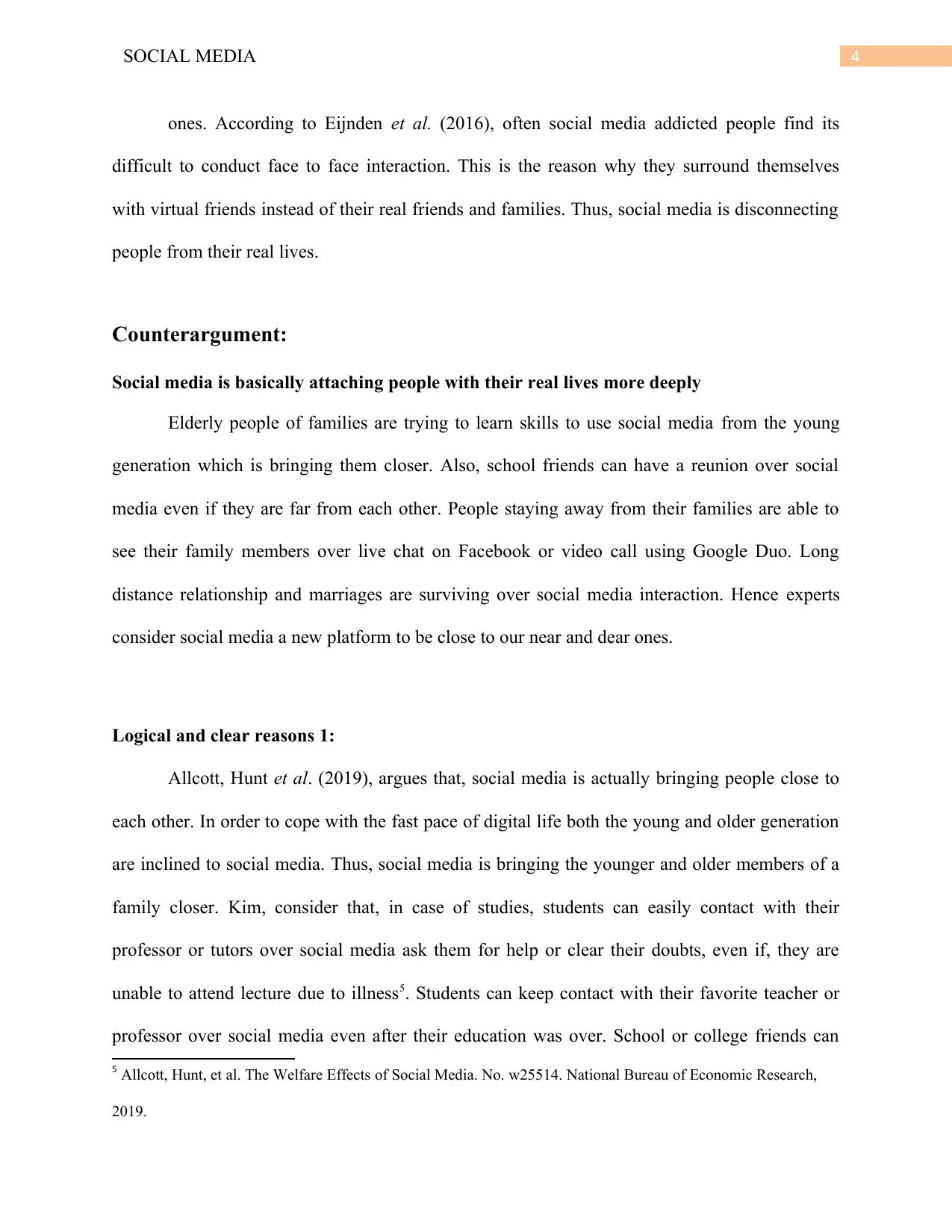
4SOCIAL MEDIA
ones. According to Eijnden et al. (2016), often social media addicted people find its
difficult to conduct face to face interaction. This is the reason why they surround themselves
with virtual friends instead of their real friends and families. Thus, social media is disconnecting
people from their real lives.
Counterargument:
Social media is basically attaching people with their real lives more deeply
Elderly people of families are trying to learn skills to use social media from the young
generation which is bringing them closer. Also, school friends can have a reunion over social
media even if they are far from each other. People staying away from their families are able to
see their family members over live chat on Facebook or video call using Google Duo. Long
distance relationship and marriages are surviving over social media interaction. Hence experts
consider social media a new platform to be close to our near and dear ones.
Logical and clear reasons 1:
Allcott, Hunt et al. (2019), argues that, social media is actually bringing people close to
each other. In order to cope with the fast pace of digital life both the young and older generation
are inclined to social media. Thus, social media is bringing the younger and older members of a
family closer. Kim, consider that, in case of studies, students can easily contact with their
professor or tutors over social media ask them for help or clear their doubts, even if, they are
unable to attend lecture due to illness5. Students can keep contact with their favorite teacher or
professor over social media even after their education was over. School or college friends can
5 Allcott, Hunt, et al. The Welfare Effects of Social Media. No. w25514. National Bureau of Economic Research,
2019.
ones. According to Eijnden et al. (2016), often social media addicted people find its
difficult to conduct face to face interaction. This is the reason why they surround themselves
with virtual friends instead of their real friends and families. Thus, social media is disconnecting
people from their real lives.
Counterargument:
Social media is basically attaching people with their real lives more deeply
Elderly people of families are trying to learn skills to use social media from the young
generation which is bringing them closer. Also, school friends can have a reunion over social
media even if they are far from each other. People staying away from their families are able to
see their family members over live chat on Facebook or video call using Google Duo. Long
distance relationship and marriages are surviving over social media interaction. Hence experts
consider social media a new platform to be close to our near and dear ones.
Logical and clear reasons 1:
Allcott, Hunt et al. (2019), argues that, social media is actually bringing people close to
each other. In order to cope with the fast pace of digital life both the young and older generation
are inclined to social media. Thus, social media is bringing the younger and older members of a
family closer. Kim, consider that, in case of studies, students can easily contact with their
professor or tutors over social media ask them for help or clear their doubts, even if, they are
unable to attend lecture due to illness5. Students can keep contact with their favorite teacher or
professor over social media even after their education was over. School or college friends can
5 Allcott, Hunt, et al. The Welfare Effects of Social Media. No. w25514. National Bureau of Economic Research,
2019.
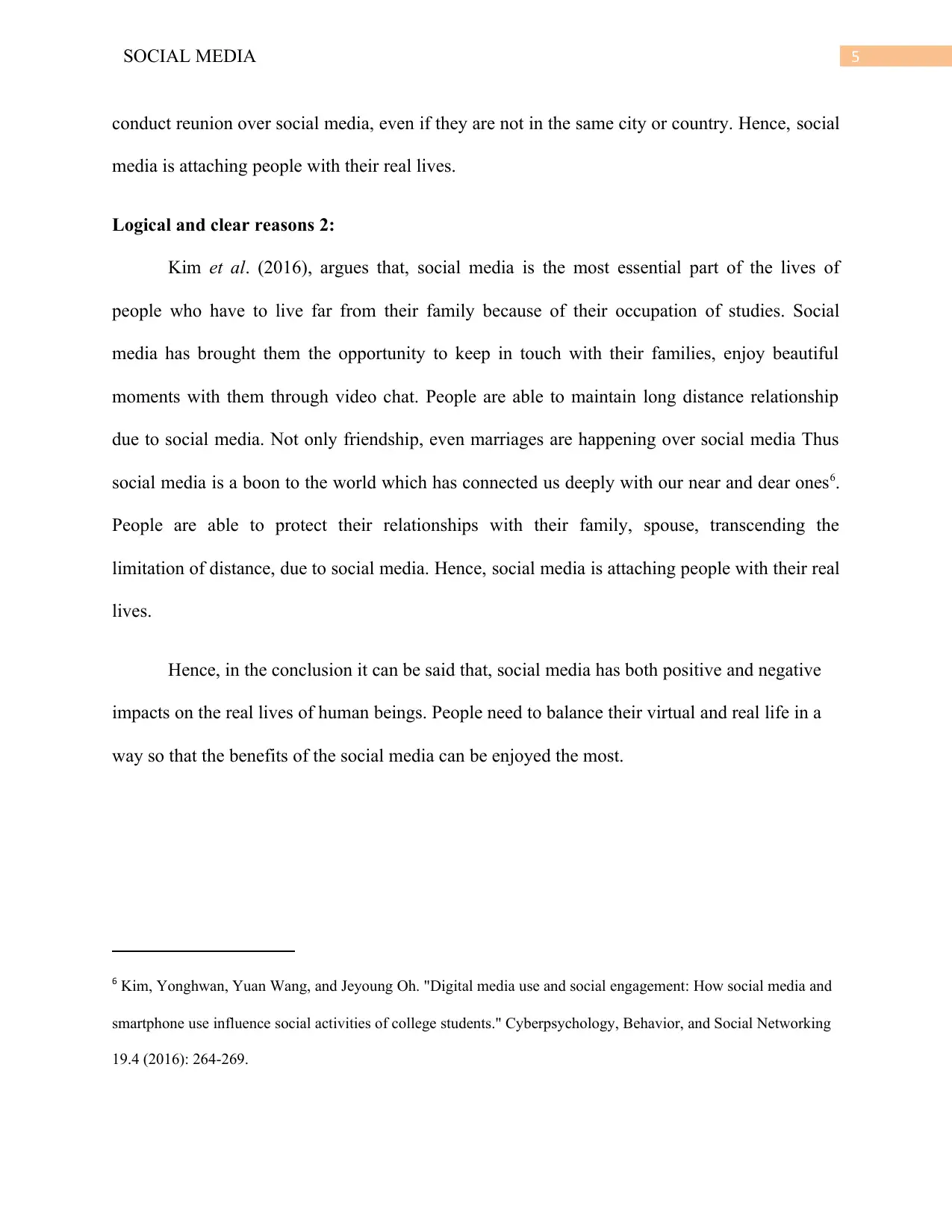
5SOCIAL MEDIA
conduct reunion over social media, even if they are not in the same city or country. Hence, social
media is attaching people with their real lives.
Logical and clear reasons 2:
Kim et al. (2016), argues that, social media is the most essential part of the lives of
people who have to live far from their family because of their occupation of studies. Social
media has brought them the opportunity to keep in touch with their families, enjoy beautiful
moments with them through video chat. People are able to maintain long distance relationship
due to social media. Not only friendship, even marriages are happening over social media Thus
social media is a boon to the world which has connected us deeply with our near and dear ones6.
People are able to protect their relationships with their family, spouse, transcending the
limitation of distance, due to social media. Hence, social media is attaching people with their real
lives.
Hence, in the conclusion it can be said that, social media has both positive and negative
impacts on the real lives of human beings. People need to balance their virtual and real life in a
way so that the benefits of the social media can be enjoyed the most.
6 Kim, Yonghwan, Yuan Wang, and Jeyoung Oh. "Digital media use and social engagement: How social media and
smartphone use influence social activities of college students." Cyberpsychology, Behavior, and Social Networking
19.4 (2016): 264-269.
conduct reunion over social media, even if they are not in the same city or country. Hence, social
media is attaching people with their real lives.
Logical and clear reasons 2:
Kim et al. (2016), argues that, social media is the most essential part of the lives of
people who have to live far from their family because of their occupation of studies. Social
media has brought them the opportunity to keep in touch with their families, enjoy beautiful
moments with them through video chat. People are able to maintain long distance relationship
due to social media. Not only friendship, even marriages are happening over social media Thus
social media is a boon to the world which has connected us deeply with our near and dear ones6.
People are able to protect their relationships with their family, spouse, transcending the
limitation of distance, due to social media. Hence, social media is attaching people with their real
lives.
Hence, in the conclusion it can be said that, social media has both positive and negative
impacts on the real lives of human beings. People need to balance their virtual and real life in a
way so that the benefits of the social media can be enjoyed the most.
6 Kim, Yonghwan, Yuan Wang, and Jeyoung Oh. "Digital media use and social engagement: How social media and
smartphone use influence social activities of college students." Cyberpsychology, Behavior, and Social Networking
19.4 (2016): 264-269.
⊘ This is a preview!⊘
Do you want full access?
Subscribe today to unlock all pages.

Trusted by 1+ million students worldwide
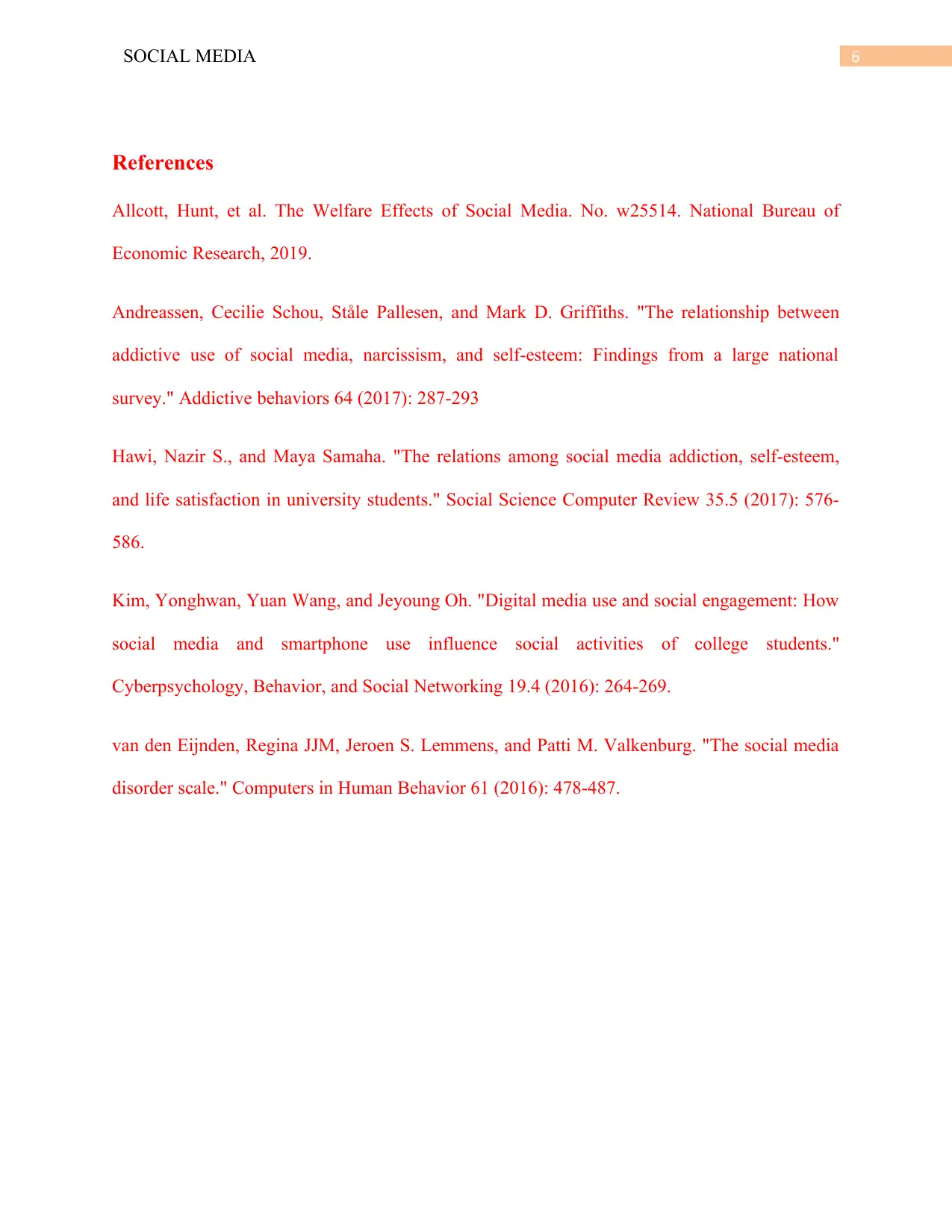
6SOCIAL MEDIA
References
Allcott, Hunt, et al. The Welfare Effects of Social Media. No. w25514. National Bureau of
Economic Research, 2019.
Andreassen, Cecilie Schou, Ståle Pallesen, and Mark D. Griffiths. "The relationship between
addictive use of social media, narcissism, and self-esteem: Findings from a large national
survey." Addictive behaviors 64 (2017): 287-293
Hawi, Nazir S., and Maya Samaha. "The relations among social media addiction, self-esteem,
and life satisfaction in university students." Social Science Computer Review 35.5 (2017): 576-
586.
Kim, Yonghwan, Yuan Wang, and Jeyoung Oh. "Digital media use and social engagement: How
social media and smartphone use influence social activities of college students."
Cyberpsychology, Behavior, and Social Networking 19.4 (2016): 264-269.
van den Eijnden, Regina JJM, Jeroen S. Lemmens, and Patti M. Valkenburg. "The social media
disorder scale." Computers in Human Behavior 61 (2016): 478-487.
References
Allcott, Hunt, et al. The Welfare Effects of Social Media. No. w25514. National Bureau of
Economic Research, 2019.
Andreassen, Cecilie Schou, Ståle Pallesen, and Mark D. Griffiths. "The relationship between
addictive use of social media, narcissism, and self-esteem: Findings from a large national
survey." Addictive behaviors 64 (2017): 287-293
Hawi, Nazir S., and Maya Samaha. "The relations among social media addiction, self-esteem,
and life satisfaction in university students." Social Science Computer Review 35.5 (2017): 576-
586.
Kim, Yonghwan, Yuan Wang, and Jeyoung Oh. "Digital media use and social engagement: How
social media and smartphone use influence social activities of college students."
Cyberpsychology, Behavior, and Social Networking 19.4 (2016): 264-269.
van den Eijnden, Regina JJM, Jeroen S. Lemmens, and Patti M. Valkenburg. "The social media
disorder scale." Computers in Human Behavior 61 (2016): 478-487.
1 out of 7
Related Documents
Your All-in-One AI-Powered Toolkit for Academic Success.
+13062052269
info@desklib.com
Available 24*7 on WhatsApp / Email
![[object Object]](/_next/static/media/star-bottom.7253800d.svg)
Unlock your academic potential
Copyright © 2020–2026 A2Z Services. All Rights Reserved. Developed and managed by ZUCOL.





